The conflict is over objectification. In the thread, the subject of burlesque came up, and how it's sickening. Terrible for women. Anti-feminist. How these "seemingly emancipated" women are just displaying "a clingy, needy desire to be adored."
Yeah, I just don't see it. I don't understand feminists who think there's something wrong with a woman choosing to show off her bits in whatever way she deems fit. Aren't they our bodies and our choices? Isn't it just a wee bit condescending to tell us "no, dear, you only think you enjoy the thing that you enjoy - you just aren't smart enough to know it's bad for you"?
And what it all comes down to is that I just don't get this whole feminist notion of "objectification." What is, objectification, exactly, and who gets to say what it is and isn't? Isn't it possible to respect a woman as a human and drool over her tasty bits at the same time? Yeah, we've got minds and hearts and needs and ambitions, but we've got bodies too, same as men. Humans can see both the physical and the non-physical, right at the same time. We're multi-taskers like that.
Which leads me to something I wrote some months ago and promptly lost. Here it is for you, in all it's dated glory.
February's GQ features a wonderfully scantily-clad Michelle Williams, showing off some curves. She's not exactly real-people sized. If you saw her in person, she might be thinner than the thinnest person you know. But in this photo, her lines are soft and round. Her stomach pooches out a tiny bit, and her thighs appear capable of supporting her weight.
On the cover of Women's Health, Elizabeth Banks stands on legs like knitting needles with an impossibly flat belly; the only part of her protruding are her perfect tennis ball breasts recklessly defying gravity.
 |
| I'm too cute and bubbly for gravity |
In men's magazines like Esquire and Maxim, women lounge on sofas, smile and flirt, curves on top of curves.
In women's magazines, articles tell us what she's wearing and how she got so majestically skeletal.
 |
| Somewhere, in somebody's attic, a painting of Olivia Wilde is growing morbidly obese |
When people blame men and their objectifying eyes for our body issues and society's unrealistic expectations of beauty, I wonder whose magazines they're looking at.
 |
| Personally, I'd rather see my daughter in burlesque. |
I don't know, man. Looking at Cosmo makes me wonder how much better off we are than our grandmas. Looking at burlesque girls - dead sexy women with curves like mine - I feel like there's hope for us yet.
On a related note, does it hurt Orlando Bloom personally or mankind as a whole that he was featured in bondage at some point in every one of the Pirates movies?
 |
| Are we even sure this guy isn't a woman? |






